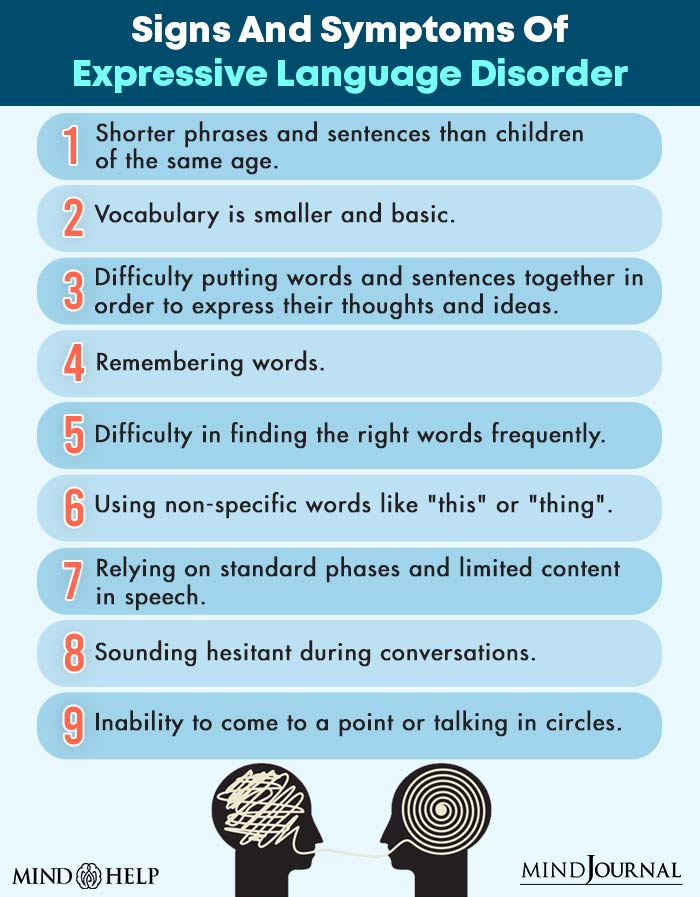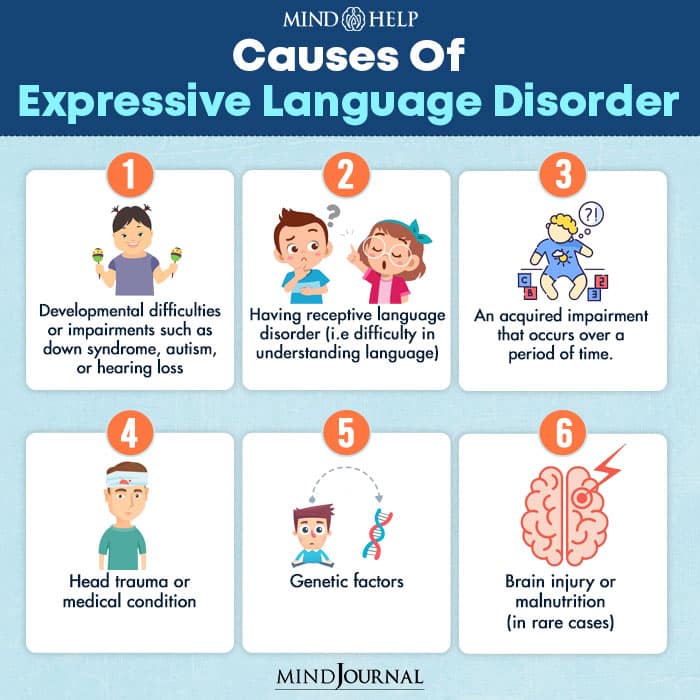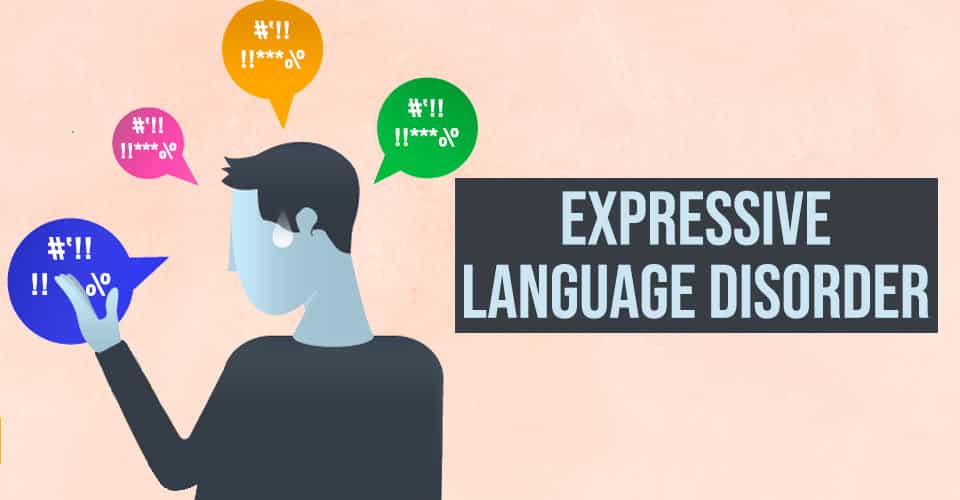Table of Contents
Expressive Language Disorder is a communication disorder characterized by difficulty in expressing oneself via speech, writing, sign language, or gesture.
What Is Expressive Language Disorder?
Expressive Language Disorder is a condition in which an individual faces difficulties with communicating via verbal or written language and is usually limited to the expression of thoughts. Vocabulary difficulties, difficulty generating complicated phrases, difficulty recalling words, and articulation impairments are common in children with this disease.
This condition is usually limited to expression and does not affect the child’s ability to read, listen, or pronounce words. In some cases, children may experience delays in the development of language skills, but they may recover over time. It is important to understand the language milestones in children in order to understand whether the child requires a speech pathologist or a doctor.
| AGE | When You Should See A Doctor |
| 15 Months Old | Not saying any words |
| 2 Years Old | Vocabulary limited to fewer than 25 words |
| 3 Years Old | Still speaking in two words sentences |
| 4 Years Old | Repeating questions or not speaking in full sentences |
Severe speech and language disabilities prevent or impede children’s participation in family and community, school achievements, and eventually employment. Evidence 1 Committee on the Evaluation of the Supplemental Security Income (SSI) Disability Program for Children with Speech Disorders and Language Disorders; Board on the Health of Select Populations; Board on Children, Youth, and Families; Institute of Medicine; Division of Behavioral and Social Sciences and Education; National Academies of Sciences, Engineering, and Medicine; Rosenbaum S, Simon P, editors. Speech and Language Disorders in Children: Implications for the Social Security Administration’s Supplemental Security Income Program. Washington (DC): National Academies Press (US); 2016 Apr 6. 2, Childhood Speech and Language Disorders in the General U.S. Population. Available from: https://www.ncbi.nlm.nih.gov/books/NBK356270/ shows that children begin to recognize speech patterns that occur in their environments early in the first year of life. When the child shows signs of expressive language disorders, it is essential to pay attention to the child’s language and speech development skills in reference to their age. If the child speaks in shorter sentences, finds it difficult to recall words, or has difficulty putting words and phrases together to form sentences, it may be a sign of communication or language disorders.
The child’s vocabulary tends to be below average when compared to children in a similar age group. They may also sound hesitant in conversations or may repeat the speaker’s words in an attempt to express themselves. Children with this condition often use filler sounds such as “uh” and “umm” because they are unable to express themselves in an appropriate manner. They also tend to confuse tenses such as “I go out” instead of “I am going out”. Hence it is important to seek treatment early to avoid psychological consequences.
The best form of treatment is working with a speech pathologist who specializes in treating and evaluating patients with difficulty in expressive languages. The Centre for Disease Control and Prevention recommends an evaluation of hearing impairment in case the child shows difficulties in expressing language. It may be difficult to notice any hearing loss if the child has difficulties in hearing in only one ear or partial hearing loss.
A 2011 study 2 McLaughlin MR. Speech and language delay in children. Am Fam Physician. 2011 May 15;83(10):1183-8. PMID: 21568252. suggested that a careful diagnosis is important because atypical language development can be a secondary characteristic of other physical and developmental problems that may manifest as language problems. A 2016 study 3 Tomblin, J. B., Records, N. L., Buckwalter, P., Zhang, X., Smith, E., & O’Brien, M. (1997). Prevalence of specific language impairment in kindergarten children. Journal of speech, language, and hearing research : JSLHR, 40(6), 1245–1260. https://doi.org/10.1044/jslhr.4006.1245 suggested that even though no supportive evidence was found, the prevalence rate is estimated to be between 3% and 5%.
Read More About Child Development Here
Classification Of Expressive Language Disorder
This disorder is further classified into two divisions. They are:
1. Developmental Expressive Language Disorder:
The exact cause of this disorder is unknown. However, it is a very common condition found in children. When a child is learning to speak, it is initially noticed. Boys are more likely than girls to experience this.
2. Acquired Expressive Language Disorder:
This condition is usually caused due to specific damage to the brain such as a stroke, traumatic brain injury, or seizures.
Signs And Symptoms

Children with this condition tend to have difficulty combining words and phrases to form an accurate sentence. Other signs and symptoms of this disorder include:
- Shorter phrases and sentences than children of the same age
- Vocabulary is smaller and basic
- Difficulty putting words and sentences together in order to express their thoughts and ideas
- Remembering words
- Using language in an appropriate manner in different settings such as at school, home, or with parents and teachers
- Making grammatical errors or forming incomplete sentences (for instance, “I talk” instead of “I can talk”)
- Difficulty in finding the right words frequently
- Using non-specific words like “this” or “thing”
- Relying on standard phases and limited content in speech
- Sounding hesitant during conversations
- Repeating speakers words
- Inability to come to a point or talking in circles
- Difficulty in oral and written work and school assignments
Causes Of Expressive Language Disorder

The specific cause of developing this disorder is still unknown. However, there may be certain factors that may be a contributor to its development. Research suggests that this disorder occurs in more than one family and across generations. They are:
- Developmental difficulties or impairments such as down syndrome, autism, or hearing loss
- Having receptive language disorder (i.e difficulty in understanding language)
- Head trauma or medical condition
- An acquired impairment that occurs over a period of time.
- Genetic factors
- Brain injury or malnutrition (in rare cases)
Read More About Brain Health Here
What Are Some Of The Risk Factors For This Condition?
The risk factors for developing this disorder are:
- Family history of speech and language delay
- Male sex
- Prematurity
- Low birth weight
- Childhood illness
- Late birth order
- Larger family size
Diagnosis Of Expressive Language Disorder
In case the child displays issues with speaking or using language in order to communicate and express themselves, it is important to seek medical help. It is important to get their language skills assessed by a speech pathologist or speech therapist and a hearing test by an audiologist.
Speech Pathologists perform several assessments in order to identify the areas of language that the child finds difficult. The assessment and evaluation tests are not difficult for the child to perform and parents are welcome to be present during these consultations.
After evaluation, the speech pathologist may also recommend the following:
- Auditory processing test that is different from a hearing test
- An evaluation of learning difficulties for school-age children
- An assessment of cognitive functioning by a registered psychologist in order to identify any underlying conditions that may be present
The doctor will devise a treatment plan based on the severity of the conditions that are diagnosed in the child.
Treatment For Expressive Language Disorder
The treatment is based on the severity of the impairment. If you see signs of language or speech impairment it is important to seek medical assistance. The treatment options include:
1. Group sessions
Group sessions with a speech pathologist can greatly benefit your child. This therapy helps the child to learn new things and practice their goals in a realistic setting. The group sessions offer the following:
- Modeling and support from a registered speech-language pathologist to help the child reach their goals
- Getting support from peers and building confidence around new friendships
- Peer communication within a realistic social setting
- Practicing in a real-world environment such as a classroom or a play date with friends
- Learning the ability to teach and learn from others
Group therapy involves targeting social communication and building language skills in an exciting way to help children reach their full potential. A 2018 study 4 Watt, A., & White, S. (2018). Efficacy of group versus individual therapy for advancing receptive and expressive language development for children aged 6–12 years within community settings: A critically appraised topic. Evidence-Based Communication Assessment and Intervention, 12(1-2), 54-71. https://doi.org/10.1080/17489539.2018.1444914 found that group sessions were as effective as individual therapy sessions for children suffering from this disorder.
Read More About Group Therapy Here
2. Individual Therapy Sessions
Individual therapy sessions offer similar practices like in group sessions in a one on one setting. The speech pathologist helps the child to improve language development, communication skills and pragmatic language skills.
3. School based language intervention programs
This program involves helping the child to improve and develop language and speech skills in a school setting. A study 5 Cirrin, F. M., & Gillam, R. B. (2008). Language intervention practices for school-age children with spoken language disorders: A systematic review. Language, Speech, and Hearing Services in Schools, 39(1). https://doi.org/10.1044/0161-1461(2008/012) found positive effects for collaborating with teachers on large group instructions, slowed presentation rate for vocabulary development, interactive conversational reading strategies, and direct instruction on analogical thinking.
4. Language Therapy
Children are required to learn how to receive new information, understand that information, and retain it in order to develop language skills. Speech therapy 6 Backus, A., & Beasley, J. (1951). Speech therapy with children. Houghton Mifflin. focuses on evaluating and strengthening these skills in order to develop a child’s vocabulary. The speech therapist uses word repetitions, images, tailored reading materials, and other tools to help nurture the language skills of the child.
5. Counseling
Children often become frustrated and socially isolated when they can’t effectively express themselves. The child may even get into fights since they can’t find the right words or phrases during an argument. Counselling helps the child to develop coping skills when they feel frustrated during communication.
Recovery From Expressive Language Disorder
Recovery may be possible if this disorder is not associated with any other condition such as hearing impairment, brain injury, or learning disability. Language therapy can help the child learn how to express themselves entirely. Counselling can help manage and ease the symptoms associated with this communication disorder such as anxiety or low self-esteem. In case the symptoms are seen, seeking early treatment is essential to minimize the psychological challenges that the child might experience as a consequence of this disorder.
Expressive Language Disorder At A Glance
- Expressive Language Disorder is a communication disorder characterized by difficulty in expressing oneself via speech, writing, sign language, or gesture.
- Children with this condition tend to have difficulty combining words and phrases to form an accurate sentence.
- The doctor will devise a treatment plan based on the severity of the conditions that are diagnosed in the child.
- Recovery may be possible if this disorder is not associated with any other condition such as hearing impairment, brain injury, or learning disability.
- Language therapy can help the child learn how to express themselves entirely.











